Aaron Dries's Blog: Spreading the gore since '84, page 2
March 5, 2012
It was the night before ebook release ...
It was the night before ebook release and all through the house … not a creature was stirring—
Oh, hold it. Something was stirring. Something in the dark. The kind of something that only starts to lurk about once you’re asleep in your bed. It crawls up your staircase towards your room, its joints popping as It moves. You can’t see It because your eyes are closed, but Its form is blocking out the moonlight and casting a dim shadow under your door … which is opening. Wider and wider.
—Sorry, I got carried away.
You only get to be a debut author on the eve of his first ebook release once, so damn-it, I’m running with the theme here.
House of Sighs has been a long time coming. I wrote it over two years ago now while traveling abroad. It was pounded out in frenzied sessions on semi-working hostel computers at all hours of the night, on borrowed netbooks, in libraries, by hand in laundromats. When the time came to format the manuscript for Samhain (with the advanced readers copies needing to get out the door A.S.A.P.) my editor, Don, mentioned to me: “Aaron, there’s some seriously weird text elements in your Word document, like thousands—indents, symbols, characters that I’ve never seen before. Our IT department is scratching their heads. Some of it’s in Chinese.”
Hmmm.
I tell you, it was a long night stripping my entire manuscript down to the 300 page paragraph, italics-less, completely un-formatted form it took for me to rebuild it up from again. But it was worth it. Unequivocally worth it.
Those moments when I was pounding my head against the wall because I didn’t know whether or not to let a character live or die? Worth it. The intense mental anguish a single sentence can put you through? Worth it.
I don’t know what kind of future is in store for my wee book. It may slip into oblivion; people may hate it. Who can tell, really? One dude’s Bible is another dude’s toilet roll—it’s all a crapshoot. Yet at the end of the day, I’d be an idiot—and I probably wouldn’t deserve to be here, on the eve of eves—if I didn’t at least hope that House of Sighs has a shelf life. Just a little. I’m not looking for a falcon of success here … I’d happily settle for a little blood-splattered courier pigeon, just so long as somebody is there to receive its message.
Time will tell. I'll see you on the other side.
Oh, and watch out for that creature on the stairs. It’s hungry.
March 1, 2012
DADDY - by Aaron Dries ... FREE short story!
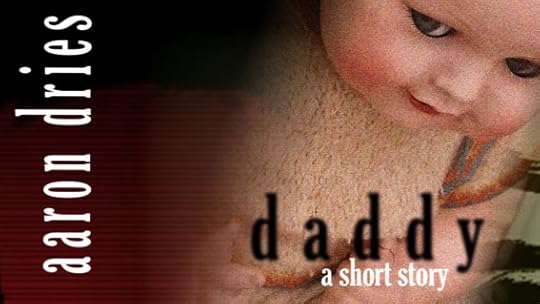
DADDY by Aaron Dries
Lewis was only two weeks into his four-month contract with the London architecture firm when he found the baby in the dumpster, lying on a cot of lettuce leaves and used condoms. He butted out the cigarette he'd been smoking, downed his coffee and ran into the alley, following the cries.
He saw her through his thick lens Coke-bottle glasses; she was naked, shivering. She sucked on his pinky finger when he cradled her in his hands. Her hunger broke something in him; something he didn’t even know was there.
“Jesus Christ,” he said, the plumes of breath freezing before his face, leaving him to wonder how the baby had survived for so long. London chill ran deep and merciless—grown men died in such cold.
He carried her back into the building, his shoes clattering up the designer glass staircase. The little baby flooded his palms with her urine, hot and stinking. His shadow passed over the immaculate carpet. Co-workers, some of whom still didn't know his name, watched him as he marched toward his office. He stopped near windows that overlooked the grey cityscape, swarming with tiny people going about their business. Dead leaves rode the wind.
The child’s uncomprehending eyes—twin blue suns—stared up at him. Into him. Bright.
Lewis had no siblings. His parents were dead and he’d never married. The concept of someone leaving a child to die in the cold was impossible for him to grasp. He shook his head, tears beading off his silk tie. His secretary stepped up beside him, her narrow face half in shadow.
“Mr. State...” It was all she could think of to say and somehow, the trailed-off sentence seemed to express it all.
*
After the screaming reporters and flashing light bulbs, the silence of his rented apartment was deafening. He felt emptied out—a picked-at carcass held together by will alone. Though the baby was gone from his arms, its weight haunted him.
He fixed himself a Weight Watchers meal that tasted like flavored plastic and didn't bother to ask himself why he expected anything different. But the taste didn't matter. Two bites in and he realized that eating was just another failed distraction. Loud television and the bland, flat beer in his hand hadn't worked their charm either.
Lewis looked around the room. The walls were vacant and so blindingly white it hurt his eyes. There was an artificial plant accumulating dust in the corner, its leaves shivering as warm air gasped from the ducted air-conditioning.
It was then that he felt the first pang of homesickness. Lewis didn't have many friends in London—and even less in Minnesota—but at least there he had his magazines. His little side projects.
His glasses made a heavy thunk as he placed them onthe dining room table. He rubbed his eyes and in the darkness saw the unnamed child, red faced and screeching. He could imagine the nurses taking her away.
*
The hospital reeked of antiseptic and piss—scents that grabbed him by the balls and dragged him back into his mother's nursing home. She didn't know who he was in the end, and the last time he saw her, she’d been sitting on a throne of her own shit.
Lewis searched for a distraction and found his feet. One step then another. Repeat. This was how he got by. His thighs brushed together as he strode down the hallway; the swish of his trousers sounded like saws felling trees. He stopped at the nurses' station leading into the Pediatrics unit. The window was decorated with Thank You cards covered in spider legged self-portraits, rainbows. A deflating balloon bobbed at the end of its string. Lewis leaned forward, cleared his throat and introduced himself.
The nurses clapped. They shook his hand. “I know this is going to sound naff, but would you sign this for me?” The staff member offered him her arm, which had been wrapped in plaster. His scribble was one of many.
“This has just made my day, shit, my whole week!” said the nurse who was now escorting him down a long, white corridor. “Oh, we named her Bernadette after the street you found her on.”
Bernadette.
Lewis rolled the word around in his mouth, just as a child would a piece of candy. The nurse gave him a smile and walked away, leaving him among the rows of cots. Some were empty. He looked down at the baby, her head cupped in his palm. He didn't think the name quite fit.
No. It seemed ... grand.
She was a tiny thing, but rough around the edges. He could see it in her eyes. He’d seen grown men without that grit—he lacked it himself. She had old eyes; the look of someone who had seen a lot, survived, and come out the other side stronger. Lewis could see it so plainly because it was something he so plainly desired.
He thought the name was inappropriate, but who was he to judge?
I'm the fella who saved her life, he thought. I've got every right to my opinion. They should have asked me to name her. But as was his typical manner, Lewis remained quiet.
Although he’d never been in the unit before, he felt like he belonged there. The baby tingled in his arms. She was such an easy thing to love. Her mouth pressed against his thumb; it felt like nothing. Like everything.
She fit inside his life perfectly.
The nurse returned two hours later and took her from him. He fought the urge to snatch her back, and it was the same every time he visited. But the pain of leaving the child behind was worth it, because when she was in his hands he felt more alive than he had in years. And then strangers who couldn’t possibly care for her the way he did would take her away, leaving him to walk through the shit-stinking hospital alone.
*
On his sixth visit, the male nurse at the station told him Bernadette was gone.
“What do you mean, gone?” Lewis asked. He was astonished at how calm he was when all he really wanted to do was dive over the counter and grab the nurse by the shoulders and shake some sense into him.
“Look, Mr. State—”
You condescending little bastard, he thought. Lewis didn't want to hear what the heavily accented man had to say. He didn't want to see his lazy grimace, that haphazard smile thrown across his face like an empty body bag over a gurney. He didn't want to see his teeth or smell the traces of cigarette smoke embedded in his skin. Lewis prepared to turn around, but the nurse's soft voice stopped him short.
“Lewis. She's been ... collected. You know? A relative came and picked her up.” The nurse sighed, feigning compassion—it infuriated him. “It wasn't her mother. Nobody has any idea where she is. It was an aunt that came and picked her up, I think. I'm sorry for you. I know how you felt about little Bern’.”
Little Bern’? Lewis stepped back. The station was a large square cut into the hallway wall; it looked about three feet in height and three by three in width. Plexiglas windows within reaching distance were covered in greasy fingerprints. Lewis traced the walls with his eyes, configuring measurements in his head. He could see the floor plans scratched onto butcher's paper and some British architect stabbing a finger at it and saying: “See here? That's where the window will go. That's what will drive him crazy—”
“Don't take it to heart. We should be happy for the little tot,” the nurse continued. “You're a hero here, mate. Remember that.”
The floorplans and sketches vanished. There was just the hole in the wall and the slight young man on the other side reaching for the Plexiglas window. Lewis stepped forward, his throat heavy. “I'm not your mate.”
*
Lewis couldn't sleep on the plane back to America.
The couple next to him looked to be in their mid-twenties, their hands intertwined. When they were asleep they snored and when they were awake, they laughed. Between their jabbing elbows and the plane’s turbulence—which even had the stewardess unnerved—Lewis felt like screaming.
He imagined doing it himself—simply opening his mouth and roaring, drawing as much attention to himself as possible. Everyone would look at him. The children would be scared, but at least they would know how much he was suffering. Someone might even recognize him from the news and turn to their traveling partner and whisper behind their hands.
“Look, there's that man.”
“The hero.”
“I wonder what happened to him?”
But Lewis didn't thump around in his seat, or scream, or do anything else to get their attention. He just sat there in silence, blinking every few moments, and stared at the emergency instruction booklet in his hands. When the stewardess rolled the service cart to a stop next to him and asked if he would like to order something off the menu, he politely declined.
*
Lewis couldn't count how many times he must have passed the store and not seen the baby doll. The thrift store had been on that street for years and it was rare for him to even notice it, unless of course it was Christmas or Easter and the large window was decorated with lights. And even on those days, he wouldn't have seen the doll were it not for the brown paper bag blowing in the wind. It had skirted across the road, rising and falling, brushing against the tarmac like a tenacious angel daring to touch the earth once more. The paper bag skirted past him and planted itself against the window with a soft crunch.
DARLING DIDDI. SHE TALKS, LAUGHS AND GOES POTTY!
The bag blew away.
Diddi stared up at him from the confines of her box. She had flushed cheeks and eyes the color of faded blue jeans. She wore pink overalls covered in flowers and knitted vine.
There was no time to hesitate over his purchase. The doll had been bought before he realized he was even in the store.
*
His apartment was an open loft fit-out with good ventilation and lots of natural lighting—an architect's wet dream. The breeze blowing in through the open window ruffled his thinning hair; the light cast his shadow long across the living room floor.
Darling Diddi sat in his hands. It was an old battered thing, scuffed and beaten, but the resemblance to Bernadette was uncanny. Her upturned nose. Her chin.
The eyes.
His phone rang and the machine picked it up. He didn't bother answering it anymore; he never accepted personal calls. His landline was simply a breeding ground for telemarketers. If it was work related they reached him by email. The only other voices he heard in his home were those filtering in from the television or on occasion, from the woman who called out, you've got mail, from somewhere inside his Mac.
Lewis doubted that the doll was the same one the box proclaimed it to be. The child in his hand looked nothing like the one printed on the cardboard inlay.
Diddi or Bernadette, his little girl looked like a Lily.
“And never an Elizabeth,” Lewis said, smiling.
It had been his mother's name, and his mother's expression.
Want an Elizabeth, go pick on a Windsor. Instead you got me: Lily.
Lewis laughed.
The battery socket looked as though it had been warped by heat, so he succumbed to the notion that he would never hear his daughter speak, but that was okay. He knew that parents feared for the health of their newborns. After all, there were challenged children being born every single day. He saw it on the news and read about it on the Internet all the time. Lily being mute was a blessing.
Life hands you barley and bones, well, go on and make some damn soup.
That had been another one of his mother's expressions.
So what if Lily couldn't speak. It didn't stop Lewis from holding his head high. “But you can hear, can't you?” he said. “Yeah, I know you can. You're smart. I know that, too. I can see the smarts in your eyes.”
Lewis pulled his baby close to his chest, took off his shirt and pushed his flaccid nipple into its mouth. He rocked her in his arms. “There you go, oh come now, it's okay. Sh-hhh.”
He wanted to sing her a lullaby but he didn't know any.
*
He had been wrong about Lily being mute. She could make noise—just nothing intelligible. There was none of the cute goo-goo-ga-ga's he’d read about in books and saw on soap operas.
There was just the crying.
Lewis would get up in the middle of the night, shaking off dreams in which he was falling or sometimes wandering the halls of his mother's nursing home, following the scent of shit and soap to her room.
He’d constructed a cot from the modeling materials he kept around the apartment for projects that required dioramas and functioning models. Lily's mattress was made from the tie-dyed silk material he purchased at the Camden Markets on one of his few trips outside London Central. The old woman who sold it to him had claimed to be blind.
Lewis plucked Lily from her bed and patted her on the back. Her cries were endless, amplified over and over in echoes of echoes.
The moonlight creeping in through the Venetian blinds painted them in gray stripes. His bare feet stuck to the tiles, and when he shuffled around, he heard clammy scratches. Lewis couldn't remember the last time he’d mopped the floors, or infact, done any of the housework that required more than just a superficial wipe. Yeah, he knew some chores were slipping through the cracks, but assumed such things were common in the lives of single parents.
Lily cried and Lewis checked her puckered mouth. Her bright blue eyes glowed in the dark. “Oh baby, you must be teething.”
*
In the dream he couldn't move. His mother was writhing in bed, fighting her sheets as though they were alive and trying to strangle her. Her face was split open in a grimace of agony and she’d wiped a layer of shit across her lips in a sickening, brown clown smile.
The wind will change and you'll be stuck with that expression, Lewis, his mother would say. Back in the days when she could form words. Back when she knew who she was talking too.
He wanted to get up and tend to her, but the last time he'd done that she'd rolled over and latched her gummy mouth on his wrist, her good arm snapping around to pinch his side. The nurses told Lewis that he could no longer approach her. That his mother had been a danger to herself for quite some time, but had now graduated into being a danger to others.
Lewis wondered how long it would take for her to die.
It seemed cruel for her to live in such a way—her soul imprisoned in a decrepit husk, without even thoughts to keep her company.
He knew that there were many long days and nights of crying to come yet. This was only the beginning.
*
“Jesus, muchacho! You look like you've spent two weeks in Vegas and haven't stopped to piss,” said Xavier, a draftsman at Lewis' firm. Xavier looked at his co-worker with two parts awe and one part concern. The concept of someone having a life outside of work excited him—and Lewis, of all people! He was more shocked than anything.
Lewis wanted to tell him about Lily, or maybe show him the small photograph of her that he kept tucked away in his wallet, but a little voice inside him told him to keep it to himself. That same voice also screamed at him to clean his act up, shave and get some sleep.
You're dying on your feet, warned the voice.
Lewis took off his glasses and rubbed his eyes. “Sorry to disappoint you, Xavier, but nope. No Vegas trip, I'm sad to say. Just a stretch of shitty nights.”
“Insomnia? Ah man, anything but that.”
“Yeah. It's a bastard of a thing; it hits you like a freight train.”
“Well Jesus, man, put down the coffee!”
His mughad the words GERM TOWN—RECONSIDER VISITING printed on it, only the lettering was threaded with stains from where his shaking hands had spilt its contents over and over again. It was yet another unwashed thing in his life. He could see his reflection in the inky liquid, warped and gaunt. He looked unrecognizable as the man he’d been prior to visiting London.
“Thanks Xavier,” Lewis said, slamming the mug down on the kitchenette counter. Some of the coffee jumped out of the mug, slapping against his shoes. “Someone's too tired to give you a smile, how about you give him one instead?” he spat, unable to hide the sarcasm.
Xavier raised his hands, trying not to laugh. “Hey, was that another one of your mother's sayings, muchacho?” he asked as Lewis rounded the corner and vanished into his office.
*
“Shut up! Shut up!”
But Lily wouldn't shut up.
Her screams were high-pitched wails that seemed to last forever. He had no idea how lungs so small could hold and then expel so much oxygen at once. The sounds she made pierced the air and dug into his ears like something alive, scratching at the inside of his skull.
Since the baby, Lewis was quick to anger at the best of times. Between the stress of multiple work-related projects and the lack of sleep, he felt like he was falling apart at the seams. Lily's cries tore him up in the most intimate ofways—as though each wail were a betrayal.
As if she knew his vulnerabilities.
Her cries for food would assimilate with his dreams so when his mother with her shit-stained smile, turned to yell at him, he heard the infantile scream. Her green eyes would turn blue just before he woke up, clutching his chest and lathered in sweat.
He tried calculating the square-footage of his room, creating sketch-ups of the designs and material requirements—anything to distract him from the noise. He buried his head under his pillow and took sleeping pills that were strong enough to make him groggy but too weak to knock him out.
Lily screamed again. And again.
Lewis towered over her, reached down and shook her by the shoulders so hard that the makeshift cradle collapsed, scattering cardboard and wire. Her baby rattle hissed as it rolled across the floor.
Lily's mouth didn’t move and the sound did not stop and her eyes did not blink. Lewis pushed his child against his chest with one hand, the other hanging limp by his side.
*
A bitter wind sent the trees outside his apartment into shudders, their branches scratching against the windows. Clouds passed overhead with the speed of a running stream. Lewis watched the television blink on and off. His eyes glazed over and grew dim. The Presidential State of the Union address was on but he had no interest in anything that was being said. Nothing the man at the podium with the black suit and handsome tie seemed to apply to his world. Not anymore.
The baby was a vampire feeding off his energy, off his love—just as his mother had done.
Yeah, she may have given him life, but it had come at the cost of his own. She had turned soft, both in mind and flesh, and come to collect the freedom she had given him at birth. That was why he put her in the nursing home; there had been no other choice.
Death had been too slow.
Lewis had lost a lot of weight. When he looked at himself in the light of the bathroom mirror, he saw shadows being cast by his ribcage. His sagging man-breasts clung to his chest like the teats of female hogs. He itched in places where he shouldn't. People had commented on his smell at work, on his dandruff.
He was beyond humiliation. Day by day his daughter pushed him into new places. Darker places.
Lily was screaming.
The television picture shrank down into a dot, lingering on the screen for just a moment.
Lewis stood up and the bones in his back cracked. He walked over to where he’d left Lily on the floor, lying on a bed of old Time magazine covers. She’d shat herself again. Her sloppy mess covered the faces of former politicians and public figures alike. But Lily didn't care, and neither did he anymore. This was the extent to which she had sucked the life from him.
Lewis picked her up. She wreathed and shook.
Her blue eyes looked into his. They’d never seemed so bright. The more she fed, the louder she screamed, the fainter he felt. “You're killing me, Lily,” he said.“You're destroying me.”
Even his voice was softer. All of its grind and edge was gone.
As though mocking him, Lily's cheeks were still the same flushed rose they had been when he saw her in the window of the thrift store. She continued to wail—or was it laughter?
“Stop, Lily. Stop now. This is your last chance.”
But she did not stop.
“Cut it out, God-damnit, Lily! Stop! Stop! Bernadette stop it!”
No response. Just the continuing noise.
He punched her in the face and felt it collapse inwards under his knuckles. One of her eyeballs fell from its socket, sailed through the air, and shattered on the floor, breaking into shards that lit up in the flickering television light.
The President continued to drone on. People were clapping. Static rained down over the audience.
Lewis felt Lily's pain; it gripped his chest. It hurt to hurt her, just as it had hurt to put his mother in the home. He remembered how she had turned to look at him, confused and afraid, as the nurses led her through those pneumatic glassdoors and into a world of white. It had also stormed that day.
Lewis opened the front door of his apartment. The wind cut through him. Leaves swirled in circles at his feet as he stumbled down the stairs, one hand on the balustrade and the other clinging to the baby. He stole furtive glances at his surroundings, frightened that someone just might hear Lily's screams and come running. Just as he had in London.
And were his neighbors to enquire, what would they find, he wondered?
Lewis knew that only someone without children would judge him. He was neither a bad man, nor a guilty one.
He passed through the trees, seeing faces in their trunks crying for mercy, and passed into the alleyway beside his building. The only light came from the street-lamp at the end of the road—it was partially obscured by the branches of an old sycamore, casting frenetic shadows over him and his crime.
The father cried with his daughter as he lowered her into the mouth of the garbage can.
*
Lewis sat on the kitchen floor. He estimated that the sun wouldn't come up for another two hours. The storm had blown itself out and sucked away all the noise. Left behind was a stillborn silence that set his teeth on edge.
He held his hands up to his face, studying the structure of his bones and veins. There was an architecture to the human body that he'd never appreciated because he'd never sought it out. Though he may get old and weathered, the structure of his being held strong. Not even death could destroy that. There were skeletons defying time in their coffins in shallow graves all over the planet.
This was one of many distractions he could employ and exploit in his newfound quiet. Lewis decided to have a shower. He could do that now without worrying about how long he pampered himself, afraid that Lily would cry for him again. There would be no more guilt. Lewis walked down the hallway and pushed the bathroom door open, reached into the darkness for the light switch. He found it and flicked it on.
The room burned bright. He saw the bathtub. The drawn-back shower curtain. The woman with the slit wrists staring back at him, lying chin-deep in a pool of blood.
Her face was framed by lifeless hair and she had bright blue eyes, just like Lily's. Only fiercer. The woman pulled herself upright and her skin tore away where her back had been resting against the lip of the tub, revealing insect-infested flesh. As she began to speak, a rosary slipped out from between her lips and snaked into the scarlet water.
“Lewis,” the woman said. When she spoke, the sound of moving phlegm rattled in her lungs. She bore a distinct South-London accent. “You wanted it, you got it.”
He tried to turn and run from the room but he stood rooted to the spot. He could feel himself shaking in his clothes. Huge wells of emotion threatened to burst free, but didn't.
Gashes criss-crossed up and down the woman's arms. Blood dripped from the wounds like honey and the tip of a razor protruded from one cut near the crux of her elbow. A flicker of sadness crossed her face and she grew still, as though she were taking a moment to reflect on where she was and what had brought her to this place. The expression died, and whatever life had been in her faded with it.
Lewis watched her jaw slacken then unhinge. The sound of it made his heart jump. He screamed and collapsed to the floor.
The woman raised her head to expose her bulging throat. Her jawbone slanted off to the side like the broken wing of a bird and her mouth opened wide.
Something's trying to get out. But by the time he understood what was happening, it was too late, and he’d seen what was pushing up her throat to peer out at him. He saw an old grinning face covered in shit.
His mother wormed and twisted under the woman's skin, trapped and shaking. Ancient fingers curled out from inside the woman's mouth, prying the lips so far apart that it looked as though she had a smile that stretched off to either side ofher head. His mother's eyes rolled back in their sockets to reveal the whites. She gasped for air and mewled like a newborn.
The cry ripped through Lewis. He crawled out of the bathroom and slammed the door shut behind him. He lay breathless in the hallway.
*
Lewis didn't know what to do or where to go, so he shuffled back into bed and drew the sheet up close to his chin. The sun was yet to come up and despite the dark, he knew he wasn't alone. He didn't need to see it to know it was there. It was close, he could feel it. After a few sluggish minutes, he could hear it too.
The tap of plastic feet. The jingle of its baby rattle like the sound of pebbles in ajar. Lewis' heart seized up and skipped a beat.
Moonlight fought through the clouds and the room dissolved from black to blue. He could see the paintings on the walls, the remaining Time magazines on the dresser. But not It.
Tap.Tap. Tap.
He swallowed hard, the noise of his clicking throat startling him. Lewis prayed for the clouds to return. Were his prayers to be answered, his bedroom would be swallowed up by the darkness so at least he wouldn't have to see it. Hearing it was one thing, but locking eyes with it was another. Lewis had shown compassion and mercy throughout his entire life, it seemed unfair that it would be denied to him now.
Chi-chi-chi-chi-chhhh, went the rattle.
There was a tug on his sheet; it tightened over his toes. He craned his neck forward, his chin doubling. Beyond the mound of his chest he could see the foot of the bed. Everything else seemed to disappear. Lewis had read once that the human focalpoint was the size of a thumbprint, and lying there, watching and waiting for its arrival, he knew that to be true.
The small hand reached up onto the mattress. Plastic fingers fumbled and latched at the sheet, folds unraveling as its weight bore down. It started to pull itself upon to the bed. Lewis wanted to close his eyes but couldn't. And then he saw it.
The crown of its bald head. Its heavy eyelashes. One cobalt peeper stared out at him from its bent-in face. The rosy cheeks, soiled and scratched. Its mouth was caught in an eternal pucker. Feed me, feed me, those lips said to him. I'm hungry.
But the words were only in his head. His visitor may have stared and stalked, but it did not speak. He was too terrified to realize how grateful he was.
A moment passed by and that last saving grace was gone.
The baby's first word was drawn out, as though the non-existent batteries in its belly were running dry like a record played at half its speed. Those puckered lips did not move. The word carried no echo. It was just for him.
“Da-aaadyy.”
* DADDY was first published in SNM Horror Magazine in March 2010
October 23, 2010
EXCERPT (House of Sighs PROLOGUE)
The following is an excerpt from "House of Sighs" by Aaron Dries. None of the following text may be reproduced without permission of the author.
PROLOGUE: IT BEGINS
“There is only one Evil: Disunity”
-Pierre Teilhard de Chardin
ONE HUNDRED AND FIVE
Suzie Marten was ten years old when she died.
Her passion was dancing. Spinning herself dizzy in search of rhythm, pirouetting until her toes hurt. Her father had bought her a pair of ballet shoes. They fit perfectly. Suzie loved those shoes with a pure love only children can feel for inanimate objects. She was wearing them when she was torn apart.
It was the ninth of November, 1995.
To Suzie, Sunday morning was the final stop between freedom and school. She both loved and hated Sundays. Suzie despised school and especially her teacher. When he got mad he threw things. She imagined he spent his Sundays alone, watching the clock, eager for Monday so he could overturn someone’s desk. He had done this to her best friend, books and pencils crashed to the floor, an eraser bounced up and clipped one boy’s ear. At recess Suzie hugged her friend. “It’s okay. I saw on the T.V that teachers can’t do that and we can sue him. He’s such a … dirty shit.”
They looked at each other, shocked. Dirty shit.
“Suzie Marten you can’t say that! If they hear you say that they’ll send a letter home to your mom and she’ll wash your mouth out with soap. I saw that one on the T.V too.”
“Na-uh she won’t. My mom’s too tired to do that. Always in bed. And besides, she says words like that! She works the dog watch at the hospital- whatever that means. She gets home from work when everyone else is getting up. I don’t know what a dog has to do with it. I once saw this boring black-and-white movie about a vampire who only ever came out at night. He could turn into a bat and flew around eating people- or something- and during the day he slept in a box. Did’ja ever see that one?”
Suzie once teased her mother’s mouth open with a spoon while she slept, to see if she had fangs. Donna Marten bolted awake, grabbed her daughter by the wrist and pulled her under the sheets. They laughed. That night they had Fruit Loops for dinner.
On the morning of the ninth, Donna fell into bed after a ten-hour shift. Her knees ached, the smell of disinfectant and cigarettes sweating out of her pores. She was too tired to shower. Suzie pulled the blankets up to her mother’s chin.
“M-oom,” Suzie said, her voice drawn out and meek.
“What is it, Honey? I’m dead on my feet.”
“Well…”
“Come on, out with it. I’m two ticks away from dreaming.”
“Well, I was wondering. How come on television Moms don’t get old? How come Julia Roberts never gets wrinkles but you’re starting to look like an old lady?” Donna stared into her daughter’s innocent eyes.
“Think yourself lucky I love you, Suzie,” she said, wishing her daughter were old enough to start lying like everyone else. They kissed goodnight, all forgiven. She watched her daughter pull the door shut.
Suzie passed a cabinet full of her gymnastics trophies in the hallway, the glass planes shaking as she bounced. Her reflection twittered from one family photo to another. Leaping into the kitchen, she slid to the refrigerator in her socks. It was covered in drawings and magnets, school reports and shopping receipts.
Alone at last.
Her father was away on another business trip. Where he went she rarely knew, but was always glad to see him go because he never came back empty handed. Once he brought a packet of wind up crayons, another time, the ballet shoes.
She watched Sailor Moon over cereal. Afterwards, she pulled her hair into a ponytail and brushed her teeth, the bristles as frayed as corn stalks after a storm. A week later her mother found dried mint splashes on the mirror. She licked them off.
Suzie put on her headphones even though the padding itched her ears, slipped into a pink leotard and tu-tu. She pressed play on her Walkman and music filled her ears. She slammed the front door as she went into yard.
In the house a hum escaped the freezer, the grandfather clock ticked. Gentle draughts tickled a wind chime near the window. Donna snored.
Suzie danced to Mister Boombastic on the front lawn. In her opinion, she lived on the most boring street in all of James Bridge, maybe even all of Australia: a rarely travelled stretch of road on the outskirts of town. Suzie had no neighbours, but should a car come along she liked the idea of being seen.
Autumn was hot that year, the house surrounded by matchstick grass. The valley hissed when the wind blew through the dead trees, a desperate, lonely sound.
Suzie spun and curtsied. She laughed to herself. I could do this all day, she thought. And I will!
She loved watching her shadow on the lawn, the way it was a part of her. But when she leapt into the air they were separated. If only she could fly forever, but she would miss her shadow. That would be sad, like losing a friend.
*
Four hours after falling asleep, panic reached into the dark and ripped Donna from her bed. Her stomach knotted, brow flecked with dried sweat. It had not been the sounds of screeching tires, or the muted gunshot that woke her- fatigue had seen to that. It was simply that her mind had fled her body and her flesh had no choice but to follow.
She threw open the door and ran from room to room. Nothing.
“Suzie!” she yelled. Her voice was feral, unrecognisable as her own. Something inside fuelled her dread. The house was empty.
Donna stumbled outside, her eyes squinting against the sunlight. Pain thudded in her head and shot down her spine. Suzie was not in the backyard. As she rounded the house and neared the front gate, she felt heat waves coming off the brick wall to her right. She fumbled with the latch. Next to her were the trashcans. Their stench reached out for her. The latch opened and the gate swung wide.
Donna ran onto the front lawn and stopped.
The Walkman was shattered near the gutter, ribbons of grey tape fluttering in the wind.
Suzie Marten was strewn in pieces across the road.
Crows fluttered over intestines, disturbing the stillness. One hopped onto Suzie’s head, spread it’s bloodied wings and squawked. It lowered its beak and bit the child’s tongue, which had been cooking against the tar.
In front of her was her daughter’s ballet shoe, the foot still inside. Donna screamed.
Her breath came short as her nostrils filled with the smell; a mixture of burnt chemicals and sugarcane, shit and salt. She would never forget it. Darkness flittered over her vision. Donna ran to her child. She lashed out at the birds. They twirled and cawed, sprinkling blood drops over her face. “Get away from my baby!” she screamed, arms thrashing. But the beaks returned to meat, soft stabbings sounds at ankle height. One crow settled on her shoulder, feathers brushed against her cheek. Her world emptied. Colour drained from her face; she clambered over gravel. This isn’t happening, she thought. It can’t be. I’m dreaming- that’s it! I’m still sleeping, my baby isn’t torn to pieces. Donna started to laugh, short deep bleats. Parents were not equipped to see such sights; to smell such insane, bitter scents.
She fought the birds again, kicked out, punching. She didn’t comprehend what she was doing until she held one in her hand. Its scream mingled with her own, formed a single high-pitched mewl that echoed across the fields. Donna let it drop, its wings broken.
Donna fell to her knees and attempted to scoop up as much of her daughter as she could. Her arms swept wide in manic, possessive hugs, pulling the larger chunks close to her chest. Tears slipped down her face. She gave in and settled on the largest intact fragment: Suzie’s head, neck, collarbone and left arm, which hung on by a thread. The birds were hungry and would not let their bounty escape without a fight. They swooped, their black eyes empty.
The chunk of Suzie was only a quarter of the corpse, but Donna thought it was heavier than her daughter had ever been intact. She turned her back to the crows, deflecting swoops and scratches. Without warning the weight in her arms lessened and Donna felt something slap against her shins. Something warm and wet.
Donna was a nurse and assisted doctors in surgery. What she saw sitting on her shins, was unlike anything she had ever seen at work. It was small and childlike. A healthy heart that still had many years of beating left to do.
Donna collapsed amid a flurry of dark wings, dark shadows.
"House of Sighs" is available for pre-order now via this link: javascript:mox();
BRICK BY BLOODY BRICK; the characters of "House of Sighs"
House of Sighs
It's the summer of 1995 in James Bridge, Australia and the passengers of the Sunday bus into town have been kidnapped by their driver, Liz Frost. Liz began that day planning to kill herself. Many would go on to believe it would have been better if she had. The gun she intended to use on herself is now pointed at her hostages and out of fear, she plans to take them home with her.
To meet the family.
There are seven passengers, and pitted against them is Liz and her deranged kin; a troupe who do not look kindly upon strangers. But as the death toll rises a painful realization forms: where does the greater danger lie? In The House of Sighs, or among the passengers themselves?
INTRODUCING THE FROST FAMILY
LIZ FROST
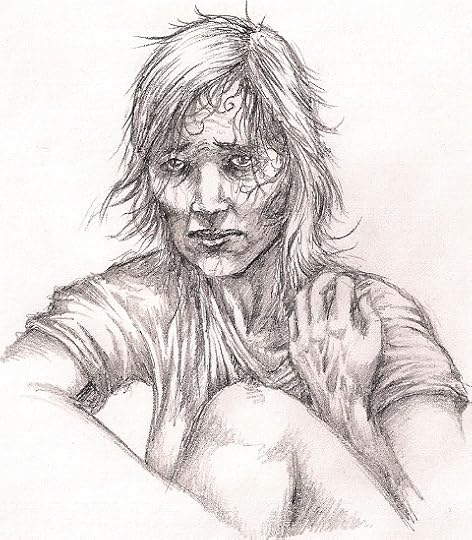
Liz Frost is a bus driver from the west part of James Bridge. She has suffered at the hands of her overbearing and often-violent father since she was a child, and has long gone ignored by her apathetic mother. She suffers from severe depression and has attempted suicide multiple times. As a little girl she became adept at hiding her bruises from the prying eyes of teachers and fellow students. She longs for love and although she wants to end her life, she clings to the hope of being saved and is terrified by the realities of death.
WES FROST
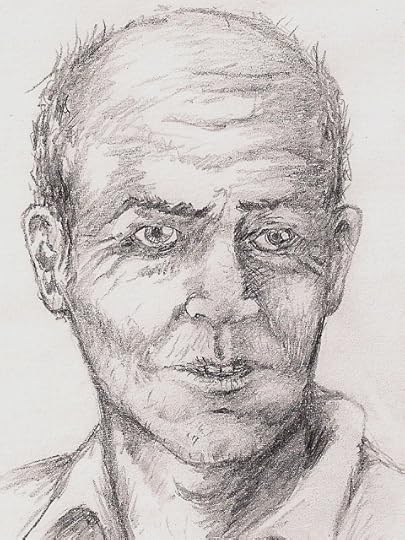
Wes Frost has a heavy conscience. His guilt over being such an abusive father and non-existent husband has come to define him. He wants to change his life and the way his family view him, but is too ashamed to admit that he has done wrong. There has always been great anger within him but over the past few years he has managed to subdue it by listening to music from his adolescence and by tending to his garden. Wes is loyal to his family, even though he rarely communicates with them. He longs for redemption but does not know how to achieve it.
REGGIE FROST
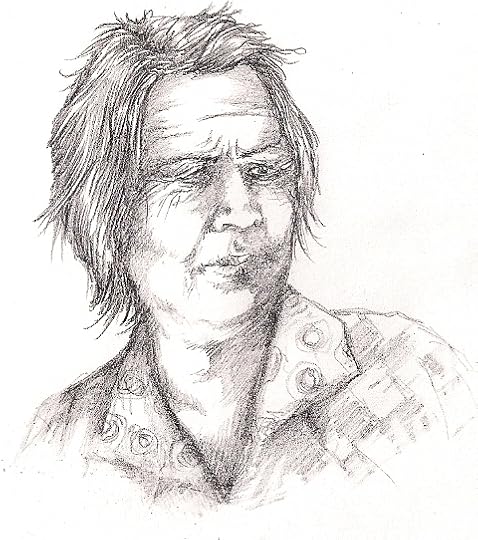
Reggie Frost has grown tired of being a wife and mother. Over the years she has grown increasingly apathetic to those around her, and numb to the abusive nature of her husband. There are however, little sparks of life left in her ... but these usually take the form of short-lived bursts of anger over small things, like the Christmas decorations outside the house, or the unwashed dishes in the kitchen sink. She loves her children but has forgotten how to show it.
JED FROST
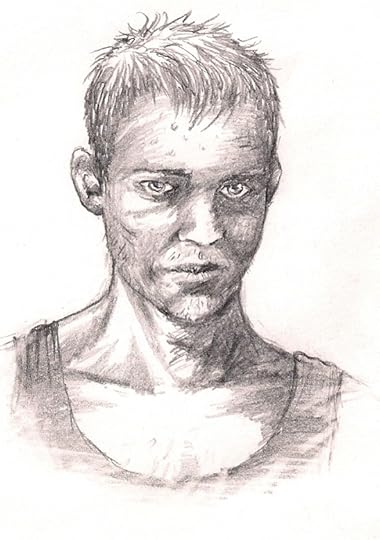
Jed Frost is a part-time shelf stacker and part time drug dealer. He has many clients but none are more loyal than his sister, Liz. He respects her deeply, she having fought for him against their father many times over the years. Jed still lives at home and spends the majority of his day tinkering with the broken down car in the shed, or ploughing into the punching bag for hours on end. Jed is loyal to his family, who serve as both a barometer for what he does not want to become and crutch of unspoken support.
INTRODUCING THE PASSENGERS
DIANA SAVAGE
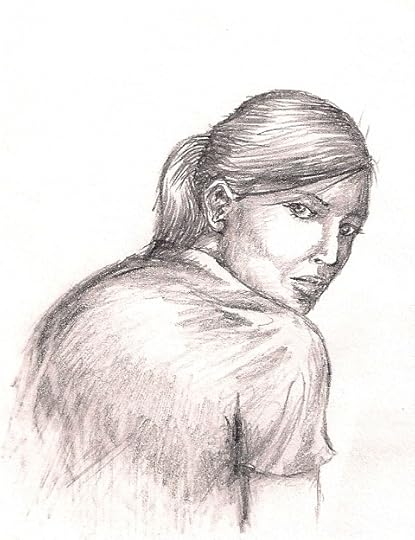
Diana Savage is a twenty-six year old American from Oregon who now calls Australia home. When she was a teenager her mother was killed in a car accident and her father later remarried an Australian tourist. Her relocation to the opposite hemisphere was initially met with anger, but the relationship with her step-sister Julia, helped her come to terms with many of the changes in her life. Diana is a little up-tight, but she is a wonderful sister. She longs to return to both Oregon and The Greek Islands, the two places that helped define who she is and all that she stands for.
JULIA BELFRY
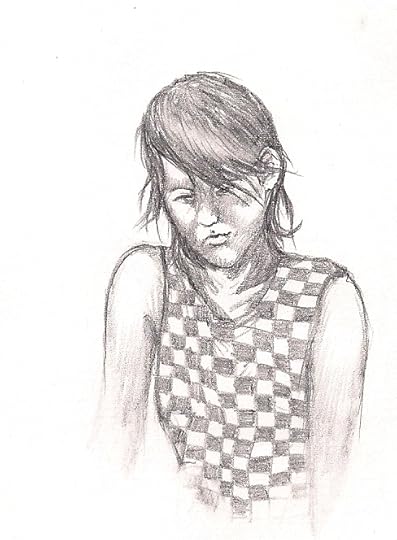
Julia Belfry is being crushed under the weight of a secret. The walls of her bedroom are lined with music posters for artists none of her friends recognise, bands like Jellyfish and singers like Grant Lee Buffalo. Music is her escape and she has become increasingly reliant upon it. She also finds comfort in her step-sister Diana’s ongoing support. On the day she met Liz Frost, Julia had been planning on going to the movies to see the Robin Williams film Jumanji. She is sixteen years old.
SARAH CARR
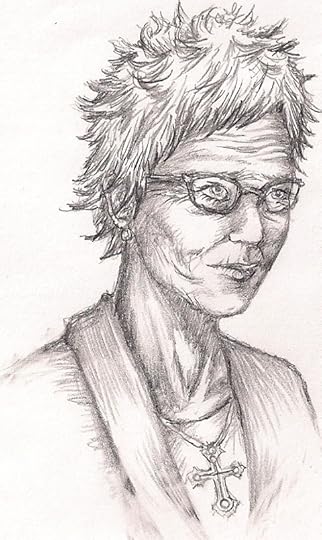
Sarah Carr is sixty-three, but she will be the first to proclaim that she doesn’t look a day over forty-five. She has always considered herself as a 'Hip Nanna'. Sarah never leaves the house without her over sized, garish crucifix- despite her recent lapse in faith. She looks after her cancer-ridden husband seven days a week, but often needs time to herself, whether it be sitting alone in her house for a minute or two, or by taking the bus into town and browsing through the book stores. Sarah’s tough and foul-mouthed veneer masks her regrets and ongoing fears.
MICHAEL DELANEY
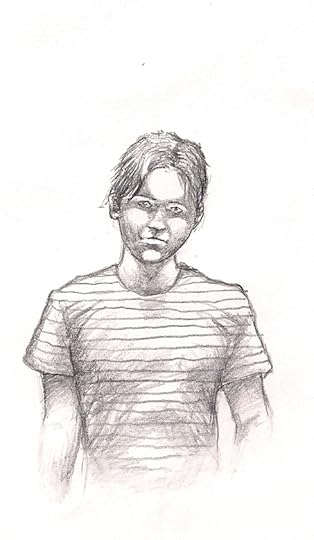
Nineteen-year-old Michael Delaney used to be fat. But now that he has lost the weight, new insecurities have taken hold of his life. He is struggling to come to terms with his homosexuality, and the haunting memories of an embarrassing event that occurred in Thailand a few years prior. Michael is on the threshold of manhood but his diffidence holds him back from being the person he really wants to be. Although he has little affinity for the beach, Michael will often day dream of the ocean.
PETER DITTON
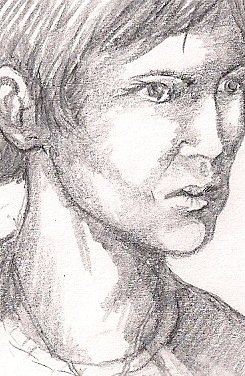
Peter Ditton is eighteen-years-old and lives with his overbearing mother in James Bridge. The most recent conflict with his guardian involves skipping Sunday church services to go to a poetry writing class with a friend. When Peter grows up he would like to be a writer, although he has reservations about his limited talent. His teacher is unimpressed with his output thus far and has challenged him to write about something real and personal; to find the truth in the things he observes and experiences. Peter takes his notepad with him everywhere he goes just in case he feels inspired.
JACK BARKER
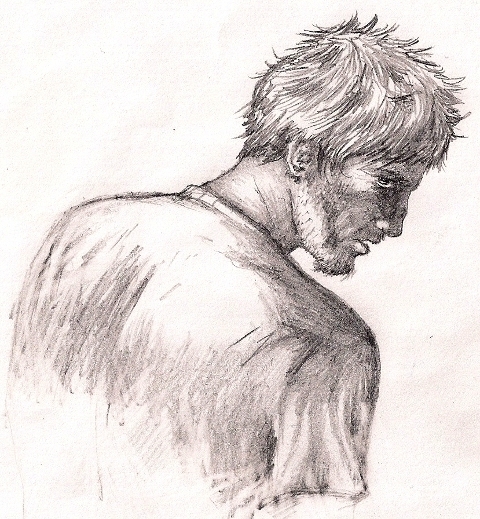
Jack Barker was born and raised in James Bridge, but his mind is relative to the size of the town: small and narrow. He does not like people who are not like him. He struggles with those who lack self-confidence and people who are not from traditional, Anglo-Saxon backgrounds. During school and the majority of his adult life, Jack has been a wingman and has been looking for a reason to step centre stage. His hands are covered in small white scars, which serve as reminders of his childhood.
STEVE BROWN
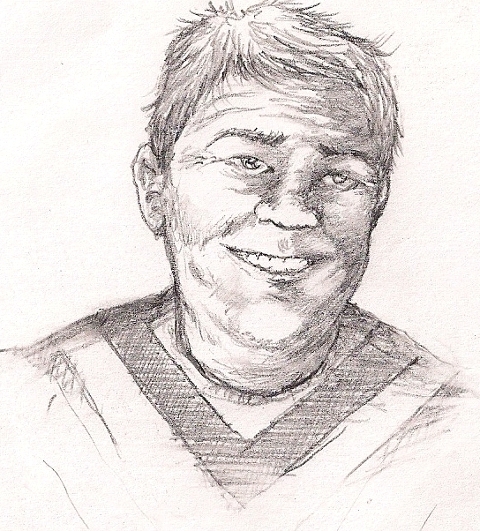
Steve Brown is having troubles at home. He adores his wife Bev, but she has been driving him mad. She is always harping at him to get a job and is particularly unimpressed that Steve planned an outing with mates at the Maitland Golf Club, when funds are so low. Steve will never be found without his 'second skin', the Newcastle Knights football jersey he wears all year ‘round regardless of the weather. Although he has been known to tell the occasional white-lie, Steve is genuine and warm-hearted.
All text and illustrations by Aaron Dries, 2010
October 7, 2010
REVIEW: The Human Centipede: First Sequence
This is such an easy film to retell, but such a hard one to review.
The plot concerns Lindsay (Ashley C. Williams) and Jenny (Ashlynn Yennie), two American tourists travelling presumably alone through an unspecified part of Germany, not too far from the reputable Autobahn. Through some contrived plotting they end up stranded in the woods with a broken down car and a non-functional mobile phone. It’s Whales’s The Old Dark House story playing out all over again; they end up knocking on the wrong door. The very wrong door. But then again, don’t they all? A minor struggle and two drug-spiked glass of water later, Lindsay and Jenny are at the mercies of mad-scientist Dr. Heiter (effectively played by Dieter Laser), a man with a God complex who wants to create a “human-centipede”. We all know how, and yes, it’s 100% medically accurate. Add to this “sequence”, Japanese man Katsuro (Askihiro Kitamura), who too has been captured and awaits the same fate.
At the core of this film is an implicitly evil conceit. And that’s why it is scary. Does the material match the heights of the conceit though? No way and that’s a shame. It is however, stylishly made, understated and serious. It’s a thin concept stretched over too wide a canvas but it’s still effective. This is a sucker-punch of an experience that most people will want to hate. And a lot of people simply will. But it’s hard to deny that the idea has a way of worming into your subconscious, of disturbing you and shaking you up. Bodily modification is a horrific notion. Just the thought of it is enough to turn your stomach. Sensitive viewers are not encouraged, although like The Texas Chainsaw Massacre and The Midnight Meat Train, The Human Centipede: First Sequence is the kind of film with a title that weeds the horror aficionado/viewer of controversial content from your casual remote flicker.
If writer/director Tom Six’s title doesn’t warn you enough, then hear it from me. There are no excuses because this film will offer no appologies. This is the joy of cinema and of being human. We are mature enough to make our own decisions and to see what we do and do not want to.
Now where were we? The film, that’s right! Look, it’s not perfect. Far from it. But it does have a lot of butts (ahem) to Six’s credit. And yes, I apologize for that terrible pun.
Let’s discuss how it could have been better. I would have recommended Six bring in a co-writer, someone with a better palate for dialogue, to flesh out the earlier scenes among the two girls. I’m not saying give us some sort of contrived back-story, but give us something at the very least. As a viewer we need a reason to empathise with the girls. They are presented as unsophisticated, unadventurous, ditsy and inarticulate. They are screechy caricatures that insist on making all the wrong mistakes- constantly, who are not smart enough to check to see if their rental car would have a spare tire, and if it did, to have the smarts or the ability to change it.
As a result the entire first act simply does not work. Why? Because there is no empathy and a film like this needs it. It’s very cold and calculated, both in content and visual design, so you can’t look for that emotional affection via those technical means. It’s all going to be through the characters and we get less than zero motivation.
For example, there is a brief conversation when the girls talk to an un-named friend on the telephone in their hotel room. Here is a prime place for some exposition. Instead of talking to an equally cold twenty-something, for whom the girls have bought a gift, why not have one of the girls talking to their parents? The effect of this change: instantly she has a family, someone who loves her and who would be worried about her if they were to miss a call. Through some very simple lines we could have found out something –anything- about these girls. Instead we get superficial annoyances that do nothing to enhance the story.Second mistake: the contrived capture. To be fair things do pick up once the girls are inside the house of the mad scientist, but prior to this we are subjected to an embarrassing car-break down sequence. The girls fumble and bicker and then embark upon a silly forest trek.
What was Six thinking?
It’s these structural mistakes that undermine the seriousness of what he was embarking upon. The girls look for help in a rainy, dark forest… Wouldn’t it make more sense to look along the road, or to turn back and go in the direction from which they came? How it should have gone down: home invasion. They are kidnapped. Simple and effective. Had six done this he would have eliminated the awkward and obligatory “the mobile phone isn’t working” scene and the stupid decision to run up the “figurative staircase instead of running out the door clichés.” Hasn’t Six seen Scream?
These initial flaws aside, the character empathy is redeemed via an act of courage by one of the girls during an attempted escape in which she makes some commendable choices. We almost get a strong heroine who you want to live. This act does gain your sympathy, but not quite enough. In all honesty it is the viewers own fears and insecurities about body mutation that carry the rest of the film. If Six had made these structural changes and then simply let his film play out as it did ... we would have a small, humble and disturbing satire. I’m not kidding. It’s not particularly explicit by horror movie standards; our minds do the majority of the slicing and dicing.
Six obviously understands the conventions of terror, but he’s yet to show the talent of a young Cronenberg, to whom this film does owe a debt. The difference between Cronenberg and Six is that Cronenberg, even at his most remote and frigid, still had back-up ideas to his primary concerns. Those films (think Rabid, Shivers and The Brood) all were three-tiered experiences; there was character, ideas and fear. This has two out of three, and one part of that (the fear) is lessened significantly due to the lack of the other. The concept of the centipede is fitting, without one segment it all will fall apart.
The central performance by Dieter Laser as Dr. Heiter is chilling and effective, if again under-developed. There is a perfunctory opening sequence which does nothing for the story at all, in which prior to shooting a trucker preparing to shit in the woods, Dr. Heiter is looking over photographs of a dog-centipede. I can guarantee you this: had he been looking at anything else, the film would be better. A) it blows the idea too quickly, the central image has been cemented in our minds and thus detracts from the impact of the human centipede reveal, and B) he should have been looking at photos of something that fuelled his motivation. Anything!
Come on people, we’re playing with simple screenwriting principles here.
Even better, get rid of the opening scene, cut all references to his prior medical history and just have the monster run free, unmotivated completely- like the shark in Jaws. You can have it one way or the other. Pick one and stick to it and make that choice work.
The fire and drive of the film is in Katsuro, the Japanese man with some fight to him. He literally saves the film. You sense his shame as his bowels release into the mouth of the woman behind him. You suddenly understand the implications and consequences of what is happening. And there is distinct power in these scenes. You understand that Katsuro refuses to be made into an animal, that he refuses to let go of his humanity and be degraded. I’m unconsciously impelled to like films which feature culturally unexpected heroes; he is not your average, white, male, hero-type. This was a wise and non-discriminatory decision. It pays off because it keeps in tune with Six’s cold, unprejudiced depiction of violence and it’s implied consequences.
The cinematography is controlled and elegant. The color palate reeks of antiseptic and bile. It’s not gritty, it’s very sleek, without being over stylized, as so many modern horror films are. The music is not overpowering and the performances of the two girls are actually quite good, once their mouths have been sewn shut. You see the fear in their eyes. That’s what counts.
Look, this is as hard a film to review, just as it’s a hard film to watch. It reminded me of early Rolf DeHeer. This film, like DeHeer’s, is paint-stripper … but it could have been acid. It’s got the concept driving it and a building reputation. Is that enough to get by? Apparently yes, as it’s doing quite well for such a stridently independent film. Added to this the sequel is already in the can.
I hope that Six has learned from his mistakes, because he displays enough talent here to make me want to see more films by him. Just get a co-writer, listen to the criticisms this film is getting, improve and grow as a storyteller. Continue to disturb us and don’t back down and compromise. There are few voices doing it today.
RATING: Officially- 2.5/5, but I'm inflating it to 3/5 because I think Six shows promise.
REVIEW: Wall Street: Money Never Sleeps
Promising Wall Street trader Jake (Shia LeBeouf) partners with the epitome of greed and corruption Gordon Gekko (Michael Douglas) - who has recently been released from his eight year stretch in prison for insider trading. The reason for their teaming is two-tiered revenge on Bretton James (Josh Brolin). Why? Well, the mischievous, speed hungry James incarcerated Gekko way back when via illegal means and unwillingly signed the financial and literal death warrant of Jake’s father figure, fellow trader and depressed mentor, Louis Zabel (Frank Langella). Among the Wall Street daggers there is an emotional backbone in the storylines of Winnie (Carey Mulligan), Gekko’s only surviving child and Jake’s Mother (played by a scene stealing Susan Surrandon). These interweaving plots are set against the backdrop of the 2008 financial crash.
Wall Street: Money Never Sleeps is not a fantastic film. It’s good ... but not extraordinary by any means, nor is it as fine as its 1987 predecessor. And why? See, that’s what’s interesting. The elements are the same. There are enough storyline deviations to stop the film from being a simple rehash. The context and setting seem perfectly suited and integrated to the plot; the financial crash is a very suited metaphor to the personal lives of these brokers and broke men. All of the performances work and the cinematography is stunning.
So where does it go wrong?
Well, honestly, it doesn’t really. It’s just that Gekko, like Stone, has gotten older. And as a result, they’ve gotten softer. Is this necessarily a bad thing? No, of course not. We all get older. But when a film is based around a pre-existing central character who is reputed as being as cold and evil as it gets ... it’s naturally disappointing when those same descriptions cannot be applied to the same character the second time ‘round.
I understand why the tone is different. And I also understand that I have to be careful what I reveal in order to not give away any spoilers. But trust me when I say this, Wall Street: Money Never Sleeps, is softer. It’s not the cutting-edge expose the original was and it’s not as sharply written. The claws have been filed down.
This said, Stone directs with panache, utilizing a lot of digital effects and split screens. Here is a director who is not afraid to take a visual motif and splurge it over the screen with the tenacity and vibrancy of a director one third his age. There is gimmickry galore on display, but the tenacity of the tech is not reflected in the plot. And that’s a shame. The vile greed and cynicism of the first film is diluted by new themes: age, legacy and family integrity- all of which are fine and commendable traits for a screenplay to hold. But it does come at a cost. There is vague sentimentality to the piece that put my off. Why? Because if money never sleeps, then why is it fading? It’s not green any more. It’s grey. The bill has passed through too many hands.
Michael Douglas is good. But due to the script he is not able to utilize the character to the degree he did in the first film. Once the twists rise to the surface you realize that it is actually a far better performance than you first imagined. But even this is undermined by a final scene that sugar-coats the bitterness in a manner that feels contrived albeit warranted.
Greed is good, and yeah, I’m sorry. I wanted the greed. If it’s so good then why deny it to the audience?
Carey Mulligan shines, she’s so radiant on screen, with a presence that many actors of her generation don’t have. The film also features LeBeouf’s best acting to date. Generally speaking, he makes me want to pull out my hair. There is a smugness to his prior performances that I find distancing and unappealing (think Disturbia and Transformers; agreed his smugness suited Indiana Jones and The Crystal Skull). This was the great revelation of Wall Street: Money Never Sleeps: LeBeouf can act- and well. But the film is owned by Frank Langella, who is in it for too short a period of time and once he is gone the film suffers. His sequences carry a gravitas that is unmatched by anyone else in the cast, except for supporting actor, 95 year old Eli Wallach, a literal scene-stealer, just as he was in Roman Polanski’s The Ghost Writer. Hell, give the guy an Oscar.
There are some definite artistic flourishes and Stone, cinematographer Rodrigo Prieto and production designer Kristi Zea instil disturbing, renaissance-style elegance to the scenes in which the dinosaur stockbrokers sit in their high-backed chairs in semi darkness, their faces emerging into light and surrounded by gold picture frames. It’s stunning. It was in these far less flashy sequences that reminded me of Stone’s consummate ability as a director as opposed to his over-stylized moments. The score by the usually distinguished Craig Armstrong is ... well, undistinguished. As a result the film lacks some needed momentum and some suspense falls flat. You can’t help feeling that the stock market crash of 2008 is under felt and that this somehow has to do with the music choice. I loved Byrne and Eno’s original song compositions, but they did lend to the softening effect. All of the elements work individually, but when added up they counter-act the film in significant ways. On top of this is the inflated running time.
This isn’t a bad trip to the movies. It’s just disappointing. It’s good to see Stone flexing his arm again instead of beating his chest. Douglas is always good on screen. It’s gorgeous to look at and Stone again manages to convey the incomprehensible stock market to a wide audience via understandable visual motifs without pandering (and yet he underestimates the audience by including a clichéd “twist” flashback sequence that everyone understands and saw coming??).
This isn’t Oscar material, it’s fodder. But it’s well made fodder, albeit frustrating.
Rating: 3 / 5



